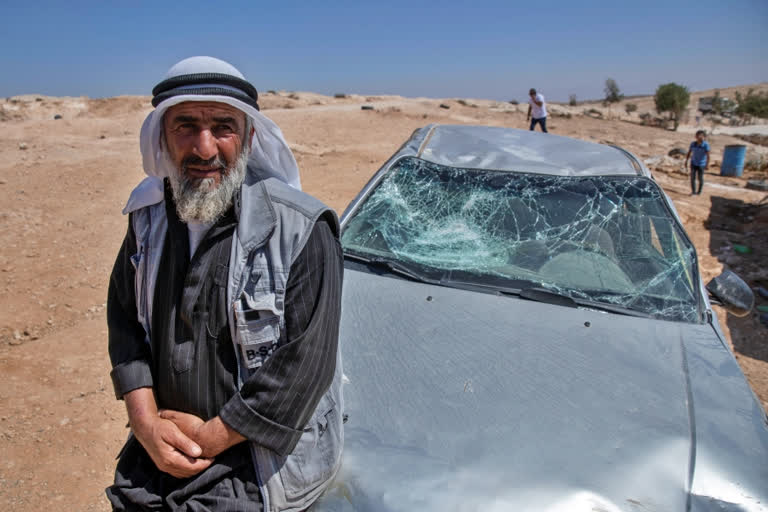Al-Mufagara (West Bank): Dozens of Jewish settlers swept down from the dusty hills, hurling rocks at a small Palestinian village in broad daylight, smashing windows, cars and water cisterns as families hid inside their homes and Israeli soldiers looked on.
Palestinians in this rural part of the occupied West Bank say last week's attack was especially violent but not unusual. They view it as part of a much larger effort by Israel to force them off their land, including by cutting off vital water resources in a parched region.
Days after the attack — in which a 4-year-old boy was hospitalized after being struck in the head by a stone as his family hid inside their home — residents of the village of Al-Mufagara surveyed the damage. It included the smashed water cisterns on which the Bedouin community and its livestock rely.
"They attacked everything we have, our water containers, our animals, our trees, our houses," said Mohammed Rahbi, deputy head of the rural Yatta regional council. "It was an attack on humanity itself."
The hardscrabble region is in what's known as Area C, the 60% of the West Bank that is under full Israeli military control, according to agreements reached in the 1990s. Palestinians say it's nearly impossible to secure building permits, even for basic infrastructure like water and electricity. The military has designated an area that includes Al-Mufagara as a firing range, making it even harder for residents to remain on the land.
Israeli authorities have meanwhile tolerated the construction of two nearby settlement outposts that are illegal even under Israeli law, where those who took part in last Wednesday's attack are believed to have come from.
After ambushing a local shepherd and killing a number of his sheep, the settlers — shirtless with scarves wrapped around their faces — rampaged through the small cluster of stone homes and animal pens.
Also read:Israeli settlers attack Palestinian village, wound toddler
Footage released by the Israeli rights group B'Tselem showed Israeli soldiers standing among the settlers as they hurled the stones. At one point a soldier threw a tear gas grenade and shoved the Palestinian who was filming the attack. "This is our home," the Palestinian shouted.
Israeli police said they arrested five Israeli suspects, including a teenager. All have since been released.
The military declined a request for an interview. But its top commander overseeing the West Bank, Maj. Gen. Yehuda Fuchs, last week held a rare meeting with Palestinian residents and said Israel is committed to the security of everyone in the area.
Israeli Foreign Minister Yair Lapid condemned the attack as "terror" and blamed it on a "violent and dangerous fringe" that he said should be brought to justice. The U.S. State Department also condemned the violence.
But rights groups say settlers have launched several similar attacks over the past year, with the military doing little to stop them.
"This is happening all the time," said Hagai El-Ad, the head of B'Tselem. "Soldiers sometimes even participate directly in such assaults on Palestinians. And this is part of that bigger state project of forcible transfer of Palestinians from their communities in large parts of the West Bank."
Israel captured the West Bank in the 1967 war and has granted the Palestinian Authority limited autonomy in cities and towns that make up less than 40% of the territory. The Palestinians want the entire West Bank to form the main part of their future state.
Around 500,000 Jewish settlers live in the West Bank amid more than 2.5 million Palestinians. Most settlers live in the more than 120 settlements authorized by the Israeli government, but more radical settlers have built dozens of outposts without state permission in rural areas.
The nationalist parties that dominate Israel's political system view the West Bank as the biblical heartland of the Jewish people and support the settlers. Israel's current prime minister, Naftali Bennett, is a longtime supporter of settlements who is opposed to a Palestinian state.
